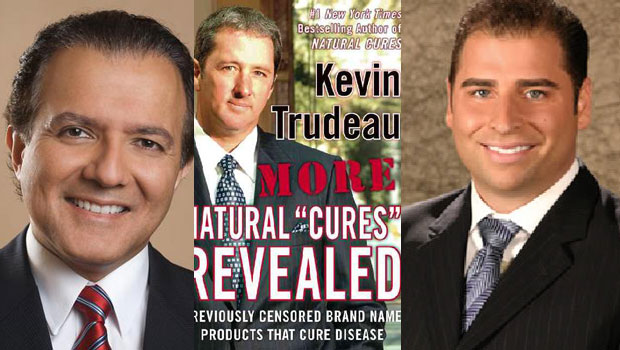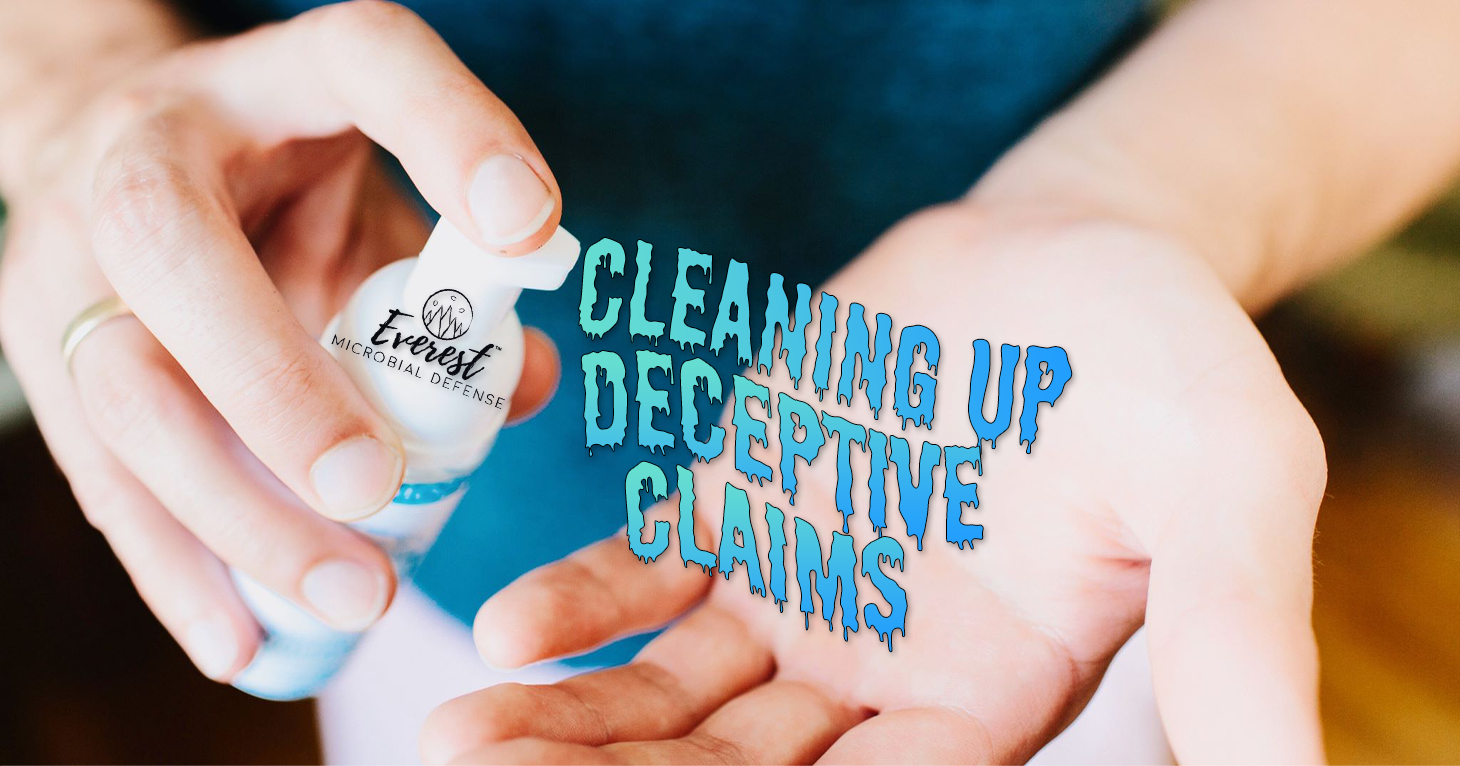
A Growing List of Coronavirus Scams
A master list of known and alleged scams.
Why can't the FTC put some hucksters out of business for good?
|
Pictured from left to right: Ajit Khubani, Kevin Trudeau, and Donald Barrett.
By Miriam Kelliher
Contributing Writer
What do the Ab Force Belt, Sable Hair Farming System, and If you believe the late-night ads, the nutrient is a ‘cure’ for a wide range of serious diseases, including cancer, diabetes, Alzheimer’s, and heart disease have in common? They were all marketed and sold in infomercials by Federal government agency charged with enforcing various consumer protection laws and overseeing identity-theft related matters. Information on the FTC’s identity theft programs can be found at www.ftc.gov/idtheft. repeat offenders —hucksters who ran afoul of federal advertising laws not once, not twice, but in some cases more than three times. According to the FTC, they lie about their products, hide their assets, and violate court orders, yet they remain on the television landscape, popping up again and again to bilk the purchasing public like a Whack-a-Mole rodent that just won’t stay down.
AS SEEN ON TV: DO NOTHING, LOSE WEIGHT!
Take, for instance, Ajit Khubani, head of Telebrands, Corp., which specializes in on-air marketing of low-cost gizmos. In 2001 and 2002, he ran infomercials for the Ab Force belt, an exercise contraption that purportedly used electrical impulses to help the wearer shape up and lose weight. After more than 700,000 belts were sold with gross sales exceeding $19 million, the FTC stepped in with a complaint in 2003 to stop what it said were false claims about the belt’s effectiveness. Khubani fought the FTC charges for more than five years, finally agreeing in 2009 to a $7 million settlement.
The FTC sent out the last of the refund checks for $17.89 — which represented 90 percent of the price consumers paid for it — to purchasers in late 2010.
Khubani, the guru of “As Seen on TV’ gizmos, had gotten into trouble with the FTC before. He paid more than $900,000 in the 1990s to settle charges that he made false claims about an antenna and hearing aid he sold, as well as failing to provide refunds, cancel purchases, and ship products on time.
Interviewed in USA Today after the settlement in 2009, Khubani said he “strongly disagreed” with the FTC’s charges of false and deceptive advertising in the Ab Force belt case and that his settlement with the agency was “a practical business decision.” He said that his run-ins with the FTC had caused him to be especially conscientious about his ads going forward.
But fear not gadget fans, Khubani’s marketing machine turns out low-tech, must-have products unabated, making available for your purchasing pleasure such gems as the Windshield Wonder, a microfiber cloth that cleans car windows, and Lint Lizard, which clears that troublesome lint from dryers. Telebrands is also marketing a new “As Seen on TV’’ weight loss belt called the Slim Away with “evapowrap fabric,” which it claims induces weight loss through sweat.
BALD ASSERTIONS: WHAT TRUDEAU DOESN’T WANT YOU TO KNOW
TINA.org Wall of Shamer Kevin Trudeau, a convicted felon, and infomercial purveyor of the baldness cure Sable Hair Farming System, among many, many other products, is another FTC repeat offender.
In 1998, Trudeau settled a false claims action brought by the FTC for — ahem — bald assertions in infomercials for Sable Hair and a myriad of other products purporting to improve the body or mind. Undeterred by the settlement, Trudeau went on to hawk new wares on the air, leading to further settlements with the FTC in 2003 and 2004 for alleged misrepresentations about dietary supplement Coral Calcium Supreme and pain remedy Biotape in which he agreed to pay $2 million. By this time Trudeau’s multiple agreements with the FTC strictly limited his infomercials to the sale of books, but even that was apparently too long a leash for the inveterate pitchman. In 2007, the FTC took him back to court again, and won. This time it was for on-air misrepresentations of the diet set forth in his book “The Weight Loss Cure ‘They’ Don’t Want You to Know About.’” Trudeau, fighting every step of the way, exhausted his appeals in 2011 of a $37.6 million court-ordered fine. When the FTC sued to collect, Trudeau helpfully offered to make good on the judgment by going back to infomercial sales if the judge would lift the bans. (UPDATE: Trudeau was found guilty in 2013 of criminal contempt and in 2015 a judge approved the FTC’s plan for consumer redress for 821,331 purchasers of his book. While Trudeau generated more than half-a-billion in revenues, less than $8 million was recovered for consumer refunds.)
DONALD BARRETT CLAIMS HE HAS A CURE FOR CANCER
Trudeau wasn’t the only infomercial king lured into trouble by the siren song of Coral Calcium. In 2002-2003, Donald Barrett began airing infomercials for it and a supplement called Supreme Greens as a cure for multiple diseases, including cancer. By April 2004, the FDA had caught up with Barrett, warning that statements he made about Supreme Greens on his web site rendered the product an unapproved new drug.
Later the same year, the FTC sued Barrett (among others) for making false claims about Supreme Greens and Coral Calcium, and using a phony talk-show format and unauthorized credit card charges to sell Supreme Greens. A lengthy court battle ensued, during which the FTC objected to the deceptive nature of infomercials aired by Barrett and for his participation in an infomercial for Kevin Trudeau’s weight loss book — all undertaken after the FTC filed its first complaint.
Finally, in October 2010, a federal appeals court upheld a $48.2 million award against Barrett. In May 2011, Barrett pleaded guilty to one count each of subscribing to a false tax return and misbranding Supreme Greens for the prevention of cancer and arthritis without FDA approval. He was sentenced to one year of probation.
REPEAT OFFENDERS: WHY CAN’T THEY BE STOPPED?
How do they brashly pitch their questionable products time and time again? Some consumer experts say the bottom line is revenue.
“The government is empowered to bring fines and restitution,” says Dee Pridgen, University of Wyoming consumer law professor, “but even with this it’s still profitable.”
Others say it’s because of the FTC has limits. In his book about the infomercial business, “But Wait…There’s More,” author Remy Stern says part of the problem is the FTC’s ability to enforce the rules. He said the FTC is “perpetually underfunded and understaffed.”
Says Stern,
Compare the number of [FTC] staff versus all of the ads on the Internet and the airwaves, plus all the consumer complaints. You could give them all the money in the world and it would still be impossible.
Some critics think that the FTC, which cannot generally levy fines, should be endowed with stronger powers to stop serial offenders. But Pridgen, the consumer law professor, says that’s unlikely to happen in the current political climate. She notes that legislative proposals to strengthen the FTC, which came at a time when Congress was viewed as more friendly to consumer protection issues, were defeated during passage of the 2010 Dodd-Frank Act.
The FTC’s James Kohm, who is the associate director of the enforcement division of the agency’s Bureau of Consumer Protection, disagrees that the problem is one of funding or inadequate laws.
“The government has to prove its case, and we have the tools we need to do that,” he says.
He points to the establishment of a criminal liaison unit within the agency, which identifies enforcement agencies that may bring specific types of fraud cases, as well as a more vigorous enforcement program in recent years as examples of the FTC’s commitment to preventing repeat violations. And he views the cases of Khubani, Trudeau, and Barrett as successes, inasmuch as the agency took them to court and stopped the violations.
In the meantime, Khubani reigns over this marketing empire; Trudeau avoids paying his fines and going to jail, and Barrett says on his Linkedin.com A personal page you create on a social networking or other website to share information about yourself and communicate with others that he is currently working for Home Shopping Europe as an executive producer.
The repeat offenders live to fight another day.
This story was updated on 10/15/15.
A master list of known and alleged scams.
The pandemic has also triggered lawsuits over privacy issues with some video conferencing apps, and more.
Company had claimed the key ingredient in its “system of protection” was proven to “kill” the coronavirus.


